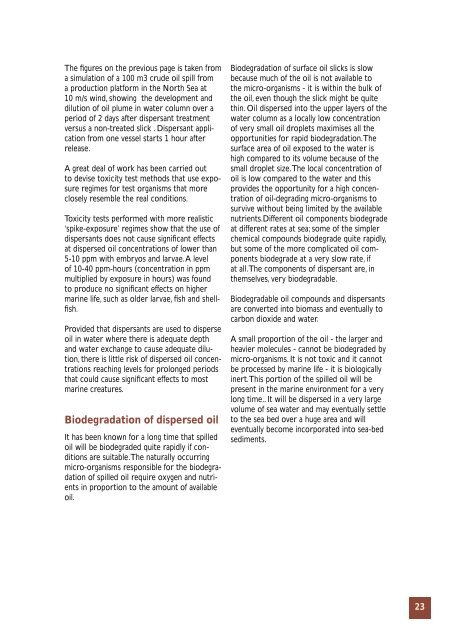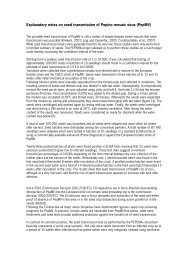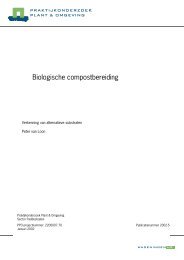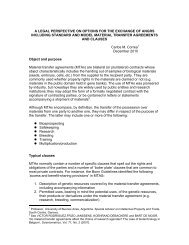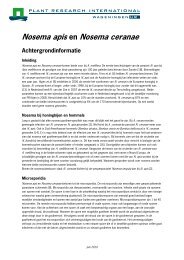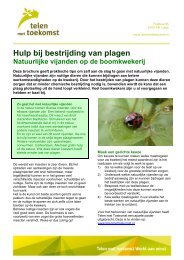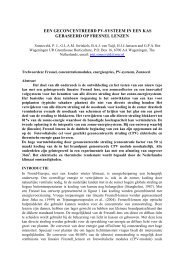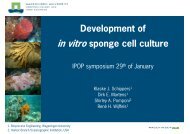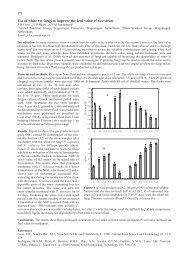Oil spill dispersant article
Oil spill dispersant article
Oil spill dispersant article
Create successful ePaper yourself
Turn your PDF publications into a flip-book with our unique Google optimized e-Paper software.
The fi gures on the previous page is taken from<br />
a simulation of a 100 m3 crude oil <strong>spill</strong> from<br />
a production platform in the North Sea at<br />
10 m/s wind, showing the development and<br />
dilution of oil plume in water column over a<br />
period of 2 days after <strong>dispersant</strong> treatment<br />
versus a non-treated slick . Dispersant application<br />
from one vessel starts 1 hour after<br />
release.<br />
A great deal of work has been carried out<br />
to devise toxicity test methods that use exposure<br />
regimes for test organisms that more<br />
closely resemble the real conditions.<br />
Toxicity tests performed with more realistic<br />
‘spike-exposure’ regimes show that the use of<br />
<strong>dispersant</strong>s does not cause signifi cant effects<br />
at dispersed oil concentrations of lower than<br />
5-10 ppm with embryos and larvae. A level<br />
of 10-40 ppm-hours (concentration in ppm<br />
multiplied by exposure in hours) was found<br />
to produce no significant effects on higher<br />
marine life, such as older larvae, fi sh and shellfi<br />
sh.<br />
Provided that <strong>dispersant</strong>s are used to disperse<br />
oil in water where there is adequate depth<br />
and water exchange to cause adequate dilution,<br />
there is little risk of dispersed oil concentrations<br />
reaching levels for prolonged periods<br />
that could cause signifi cant effects to most<br />
marine creatures.<br />
Biodegradation of dispersed oil<br />
It has been known for a long time that <strong>spill</strong>ed<br />
oil will be biodegraded quite rapidly if conditions<br />
are suitable. The naturally occurring<br />
micro-organisms responsible for the biodegradation<br />
of <strong>spill</strong>ed oil require oxygen and nutrients<br />
in proportion to the amount of available<br />
oil.<br />
Biodegradation of surface oil slicks is slow<br />
because much of the oil is not available to<br />
the micro-organisms - it is within the bulk of<br />
the oil, even though the slick might be quite<br />
thin. <strong>Oil</strong> dispersed into the upper layers of the<br />
water column as a locally low concentration<br />
of very small oil droplets maximises all the<br />
opportunities for rapid biodegradation. The<br />
surface area of oil exposed to the water is<br />
high compared to its volume because of the<br />
small droplet size. The local concentration of<br />
oil is low compared to the water and this<br />
provides the opportunity for a high concentration<br />
of oil-degrading micro-organisms to<br />
survive without being limited by the available<br />
nutrients.Different oil components biodegrade<br />
at different rates at sea; some of the simpler<br />
chemical compounds biodegrade quite rapidly,<br />
but some of the more complicated oil components<br />
biodegrade at a very slow rate, if<br />
at all. The components of <strong>dispersant</strong> are, in<br />
themselves, very biodegradable.<br />
Biodegradable oil compounds and <strong>dispersant</strong>s<br />
are converted into biomass and eventually to<br />
carbon dioxide and water.<br />
A small proportion of the oil - the larger and<br />
heavier molecules - cannot be biodegraded by<br />
micro-organisms. It is not toxic and it cannot<br />
be processed by marine life - it is biologically<br />
inert. This portion of the <strong>spill</strong>ed oil will be<br />
present in the marine environment for a very<br />
long time.. It will be dispersed in a very large<br />
volume of sea water and may eventually settle<br />
to the sea bed over a huge area and will<br />
eventually become incorporated into sea-bed<br />
sediments.<br />
23


